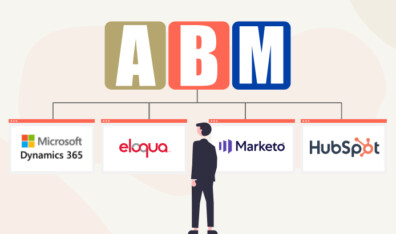We help you generate more leads.
Connecting the dots in B2B: About data, technology and leadership

Interview with Richard Robinson
“Connecting the dots is about truly understanding your customer. Bringing together the data and insight you have and using it to enhance your relationship with your customers. By better understanding your customers you can service them in a more personalized way.”
Earlier in his career Richard Robinson talked about the tipping point between marketing as we know it, and marketing as it will come to be known. Robinson, CCO at Data Practitioners, used to be VP at Cambridge Analytica Commercial, a data and behavioural science company helping organizations to understand how to use data to empower the way they can connect to customers.
For Robinson, making a difference is a passion. After his undergraduate degree in History and a short period working in the public sector, he moved into the world of technology and marketing. His career has included working in the IT Analyst and Media sectors, in AdTech and at digital giant Google as Director of B2B. He also chairs DMA UK’s B2B Council.
I am speaking to Richard Robinson about the changes in marketing and more specifically about the role of technology in marketing.
What exactly is the tipping point in marketing?
“At the moment we see a tipping point on several axes in marketing”, so says Robinson. He describes the big role of data, the rise of technology and the change in structure and organization design of the marketing function.
Understanding the data
Data will enable businesses to be more customer-centric and will bring the panacea of the ‘right message to the right person at the right time’ within reach. Especially with the new data regulation driven by GDPR, we see a shift in attention to data. Data will help us to connect to the customer in a far more personalized and a far better way.
Robinson: “We have been collecting data for many years without knowing exactly what we would do with it. Due to regulatory changes, we must wake up, better understand data and join the dots. Some people say that GDPR is a negative, but I see it as a positive opportunity. We can now focus on truly understanding the data, by breaking down the silos where data is stored. We can finally focus on getting to know our customers and personalize our marketing. Data is the lifeblood of any business. We cannot afford to just collecting data and not use it to create a positive experience for our customers.”
“Data is the lifeblood of any business. It must be useful and usable. We can now finally step away from mass marketing.”
Rise of technology in marketing
Many B2B companies have vast amounts of technologies available. “We will see a movement from technology simply enhancing marketing to a stage where technology can empower marketing. You can think of e.g. marketing automation. As part of this, I see that marketers are finally taking control of the technology in marketing and importantly the budget going with it. This is a power shift. The business function of marketing will be in the lead, they will be dictating which marketing technology that should be used”, so says Robinson.
Next level marketing automation?
Structure and organizational design of marketing
Next to data and technology Robinson sees a shift in the role of marketing from creative, project and campaign management to a more analytical role: “This means that we will see more data scientists in marketing departments. We will have to be more data savvy. We will see left and right brain thinkers coming together. This will transform the way that marketing will be perceived across the business. We can finally prove how we make the difference.”
Difference B2C versus B2B
We know that in consumer marketing it’s all about the numbers game, the influencers, advertising and social. You’d think that B2C are way ahead of B2B companies when it comes to data. Robinson sees the opposite: “B2B companies are sitting on a wealth of data, and marketers can be laser-focused when targeting their customers. B2B has a head start, because usually they have a direct relationship with their customers. Engagement is very important in B2B.
In B2C it’s far more hands-off, it is very difficult to connect to a consumer, they don’t have a direct customer relationship. Think about the example of me buying a bad pair of jeans, my wife will not fire me for doing so. Imagine if I’m an IT-manager and I make the wrong purchase decision for my company, I can lose my job over it.”
The leap to modern marketing, how do we do that?
Not everyone is in the same stage of development yet. Many times we have seen that technology companies are leading the troops. Robinson: “They do more than simply running campaigns and filling the pipeline. As I mentioned before it is about connecting the data, using the right technologies and adding the right skills to the team.”
Picking the right technology isn’t always easy and Robinson claims that companies tend to use only 20-25% of the capability of a tool (e.g. marketing automation). This can be because of lack of skills in the team, or simply because the tooling is too complex. So, it is not always due to the marketers. Robinson believes that there will be more consolidation of the big martech players such as Oracle, Salesforce and Adobe. The big ones will get bigger.
About marketing leadership
“One thing that stands out to me at this time is leadership, and the role that marketing can and should play in the leadership of the business. Marketing leaders need to be open-minded to this new game. And, if they are not the experts themselves, they must change the way they hire. We will also have to adapt to a new way of working. No longer can we set a year plan and then simply execute. We must be quicker, we must test and learn, be agile, and work in sprints if you like.”
It’s not about technology, it’s about the customer
Robinson: “Whatever you do, it has to be customer-centric. Technology can enable, enhance and empower you to connect to your customer. But if you send a one-size-fits-all newsletter to all your customers, at best this will be ineffective. At worst, it will damage your relationship with them. We tend to create wonderfully polished messages without speaking to our customers first to understand what they want to hear.”
Collecting and connecting insights at every touch point is key
What should marketers do tomorrow? What should we do differently? Robinson: “It is very important to truly understand your customer, collect the right data, so you can offer something of value to them. This might well be by combining data from your website, CRM and marketing automation tools and doing something with it. Big data is important. The actionable insights you get out of it are critical.”
Connecting the dots
Robinson was one of the keynote speakers at the B2B Marketing Forum in The Netherlands. The impact of data-driven marketing has never been in sharper focus. But what does this mean for B2B marketers? How will the combination of data analytics, behavioural science and micro-targeting be transforming the way that organizations are engaging with customers and prospects?
Share this article
Related insights
Grow your B2B Marketing knowledge
Subscribe to keep up with our latest B2B Marketing updates and exclusive events. Straight to your inbox, once a month.



